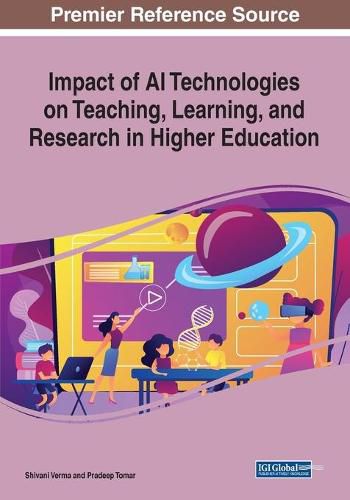Readings Newsletter
Become a Readings Member to make your shopping experience even easier.
Sign in or sign up for free!
You’re not far away from qualifying for FREE standard shipping within Australia
You’ve qualified for FREE standard shipping within Australia
The cart is loading…






This title is printed to order. This book may have been self-published. If so, we cannot guarantee the quality of the content. In the main most books will have gone through the editing process however some may not. We therefore suggest that you be aware of this before ordering this book. If in doubt check either the author or publisher’s details as we are unable to accept any returns unless they are faulty. Please contact us if you have any questions.
Within higher education, there are enormous untapped opportunities for product/services companies, administrators, educators, start-ups. and technology professionals to begin embracing artificial intelligence (AI) across the student ecosystem and infuse innovation into traditional academic processes by leveraging disruptive technologies. This type of human-machine interface presents the immediate potential to change the way we learn, memorize, access, and create information. These solutions present new openings for education for all while fostering lifelong learning in a strengthened model that can preserve the integrity of core values and the purpose of higher education.
Impact of AI Technologies on Teaching, Learning, and Research in Higher Education explores the phenomena of the emergence of the use of AI in teaching and learning in higher education, including examining the positive and negative aspects of AI. Recent technological advancements and the increasing speed of adopting new technologies in higher education are discussed in order to predict the future nature of higher education in a world where AI is part of the fabric of universities. The book also investigates educational implications of emerging technologies on the way students learn and how institutions teach and evolve. Finally, challenges for the adoption of these technologies for teaching, learning, student support, and administration are addressed. Highlighting such tools as machine learning, natural language processing, and self-learning systems, this scholarly book is of interest to university administrators, educational software developers, instructional designers, policymakers, government officials, academicians, researchers, and students, as well as international agencies, organizations, and professionals interested in implementing AI in higher education.
$9.00 standard shipping within Australia
FREE standard shipping within Australia for orders over $100.00
Express & International shipping calculated at checkout
This title is printed to order. This book may have been self-published. If so, we cannot guarantee the quality of the content. In the main most books will have gone through the editing process however some may not. We therefore suggest that you be aware of this before ordering this book. If in doubt check either the author or publisher’s details as we are unable to accept any returns unless they are faulty. Please contact us if you have any questions.
Within higher education, there are enormous untapped opportunities for product/services companies, administrators, educators, start-ups. and technology professionals to begin embracing artificial intelligence (AI) across the student ecosystem and infuse innovation into traditional academic processes by leveraging disruptive technologies. This type of human-machine interface presents the immediate potential to change the way we learn, memorize, access, and create information. These solutions present new openings for education for all while fostering lifelong learning in a strengthened model that can preserve the integrity of core values and the purpose of higher education.
Impact of AI Technologies on Teaching, Learning, and Research in Higher Education explores the phenomena of the emergence of the use of AI in teaching and learning in higher education, including examining the positive and negative aspects of AI. Recent technological advancements and the increasing speed of adopting new technologies in higher education are discussed in order to predict the future nature of higher education in a world where AI is part of the fabric of universities. The book also investigates educational implications of emerging technologies on the way students learn and how institutions teach and evolve. Finally, challenges for the adoption of these technologies for teaching, learning, student support, and administration are addressed. Highlighting such tools as machine learning, natural language processing, and self-learning systems, this scholarly book is of interest to university administrators, educational software developers, instructional designers, policymakers, government officials, academicians, researchers, and students, as well as international agencies, organizations, and professionals interested in implementing AI in higher education.